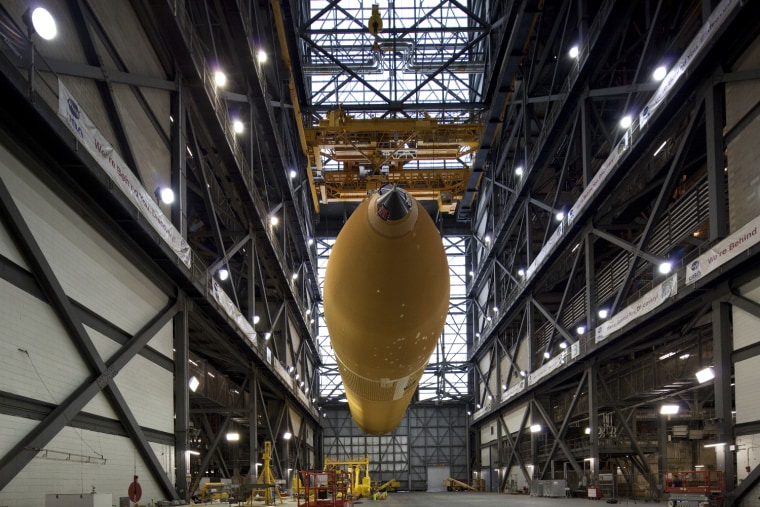Congress has approved a blueprint for NASA's future that extends the life of the space shuttle program while backing President Barack Obama's intent to use commercial carriers to lift humans into near-Earth space.
The House vote late Wednesday sends Obama a bill that rewrites NASA's space agenda. It would dismantle the program under which former President George W. Bush sought to return astronauts to the moon, and extend the life of the International Space Station from 2015 to 2020.
The bill relies mainly on the still-nascent commercial space industry to transport astronauts to the space station over the next five years. But in a nod to concerns about NASA jobs, it also speeds up development of a heavy-lift launch vehicle and funds the shuttle program for another year.
The bill authorizes a $19 billion budget in fiscal 2011 as part of a $58 billion spending plan over the next three years. However, a separate appropriation bill must still be passed to start the flow of funding in a new direction. That legislation is not likely to be considered until after the November elections. In the meantime, NASA spending will be governed by the continuing resolution also passed by Congress on Wednesday night.
However, the reauthorization bill that won final approval on Wednesday essentially establishes the space agency's agenda for the coming fiscal year.
To streamline the process, the House considered the version of the bill already approved by the Senate. The procedure required a two-thirds majority, which the bill easily won on a 304-118 vote.
The bill's opponents feared that the Senate measure did not set aside enough money for the extension of shuttle operations or for heavy-lift development, and would force NASA to take money from other space programs. They also warned that the bill placed too much reliance on commercial launch providers.
Most supporters acknowledged that they were not fully satisfied with the legislation but said they wanted to provide clarity for agency employees and contractors who are facing layoffs with the wind-down of the shuttle program. Currently, the final shuttle flight is scheduled for launch in February, but the newly approved legislation would authorize one more flight next summer.
Some Republicans worried that failure to pass the bill would have given the White House an opening to cut back on America's space effort.
"While I am not completely satisfied with the Senate bill, I am very pleased it passed. Congress is obligated to provide clear policy direction to NASA to keep vital agency programs funded and on track," Rep. Ralph Hall, R-Texas, ranking member of the House Science and Technology Committee, said in a statement. "This administration's misguided plan for human spaceflight would put NASA on a dangerous and unproven path. It is essential for Congress to weigh in and pass a bill to counter these policy objectives; otherwise we would essentially be rubberstamping the White House plan."
Sen. Bill Nelson, D-Fla., who played a key role in working out the Senate version of the bill, said the House's approval marked "a great night for our nation's space program."
"This bill is a blueprint for how we will proceed for the next three years and allow NASA to begin planning for an extra shuttle flight," Nelson said in a statement. "Now we have to make sure the agency gets the funding necessary to get the job done."
NASA Administrator Charles Bolden also hailed Congress' final approval. "It is clear that our space program inspires passion and dedication across party lines, and for that we are truly thankful," he said in a statement.
Bolden insisted that the bill would follow through on Obama's space policy.
"The plan invests more in NASA; extends the life of the International Space Station; launches a commercial space transportation industry; fosters the development of path-breaking technologies; and helps create thousands of new jobs," Bolden said. "Passage of this bill represents an important step forward toward helping us achieve the key goals set by the president."
The bill would set aside $1.6 billion over the next three years for the development of private-sector spacecraft capable of carrying astronauts to and from the International Space Station. Among the companies likely to vie for those funds are the Boeing Co. and Lockheed Martin, which currently work on the shuttle program through their United Launch Alliance joint venture; as well as SpaceX and Orbital Sciences, which are already building spacecraft for cargo deliveries to the space station.
The legislation goes along with Obama's decision to cancel NASA's Ares 1 rocket development effort, but instead calls on the space agency to develop a heavy-lift vehicle that would be ready by 2016 to take on missions to near-Earth asteroids or other destinations specified in Obama's space vision.
This report includes information from The Associated Press and msnbc.com.
